#whats the term? gay subtext?
Explore tagged Tumblr posts
Text

God I am OBSESSED with this panel. The sheer amount of yearning in Jason's eyes, looking almost shy. Sneakily stealing a glance at Dick. Dick smiling a little, staring up at the ceiling, completely unaware of Jason's stare.
This feels, like, CLASSICALLY gay. This feels like a scene you'd see in a movie or show where two characters are clearly pining for each other but haven't yet confessed (but it's clearly heading that way).
Like, there is ZERO way to interpret this as platonic or as "just hero worship". Especially in the context of the entire annual. It feels like a 150k slowburn fanfic the way this annual is written. This entire thing threw me off so badly when I just joined the fandom bc this doesn't at all feel platonic.
I could talk about this annual for HOURS man
#nightmare speaks#jaydick#dickjay#dick grayson#jason todd#dc#dc comics#i doubt the intention of the writer was to make this seem gay#but considering the direct parallel with Willis in this annual...#idk i wouldn't be surprised lmao#it just seems really overtly like. gay#whats the term? gay subtext?#Jason is just there admiring Dick LMAO#he sounded like he was gearing up for a confession too before he aborted it#Artemis was so real when she was like “what is going on between you two”#she clocked them fr#oh my god Jason was ADMIRING DICK. like physically#bc Dick chose to sleep half naked for some reason and Jason's staring at him all shy lookin#jesus it just gets gayer the more i look#“brothers” my ASS
849 notes
·
View notes
Text
highest compliment of my life would be if someone thought i was a lesbian
#but my stupid ass cant even telegraph bisexual despite having brightly coloured hair 😞#oh context#apparently young men these days dont like using the term Partner#obviously the subtext being bc shock horror what if someone mistakes you for being GAY 😱#me listening to this like sighhhh i wish someone mistook ME for being gay...
9 notes
·
View notes
Text
I really don't think enough people get how isolating it is to be the queer kid that has absolutely 0 novels of romance for them tbh tbh
#I HAD TO GO FOR THE CLASSICS TO GET THE GAY SUBTEXT#LIKE JESUS#this is what im saying when I do think heartstopper SHOULD BE A THING!!!!#like yes it doesn't speak to me personally but to other queer kids#It WILL absolutely WILL!!!!!!#also having cishet girls on your ears telling u to read x new ya romance slop and trying to make u feel like ur the weird one for not likin#the same rehashing of the same fucking tale was exhaustinggggg#for a long time it did made me feel like yeah maybe its something wrong with me and I just can't do romance 🤷🏽♂😔#SIKEEEEEE#turns out I just had other terms of romance like... y'all... like🏃🏽#which mind u#i wasn't the only middle schooler who was queer#most of the queer girls we're pretty fucking nice 💞#shout out to the GOAT (who i cannot say her name but I still stan tf out of her)
3 notes
·
View notes
Text
I agree with the sentiment of this post - none of the Mash characters were intended to be read as gay/bi/trans/etc - but I don't think it's an incorrect use of the term coding to say that, eg, Hawkeye or Klinger are queer coded.
"Coding" doesn't just refer to intentional subtext ime, it refers to using culturally recognized traits/stereotypes in a character to make the intended audience respond to them a certain way. Like how some Disney villains are queer coded - Scar wasn't intended to be understood as gay, but he's effeminate and campy to make him appear less normative than masc hetero Mufasa and Simba and therefore more clearly read as a villain to audiences in a homophobic society.
imo you can say Hawkeye is queer coded in a similar way, with how pointedly he's depicted as unmasculine and flamboyant to an extent with the jokes etc, but in the show's context it's not to make him a villain, or to say he's lowkey actually bisexual, but to make him more overtly counter to normative traditional American society, which is something Mash started out making fun of as a satirical show largely informed by the American counterculture.
lmao i know this is so low stakes but i do not know how to explain to people that the man from midcentury television you are obsessed with is almost definitely not in fact queer coded, you are reading a character through a queer lens
#more in response to the response than the op bc op is vague enough that idk what examples they're thinking of#that said idt bj is queer coded in any usage of the term if that's who op is referring to#but that doesn't mean there's no homoerotic subtext with his character - idt that has to be intentional either#text post#mash#marley on mash#i guess this is probably beside the point being made lol since most ppl in fandom use 'coding' to mean secretly gay on purpose but still
1K notes
·
View notes
Text
YES Mike eating fruit on pizza was a gay metaphor
I saw a comment saying that Bylers are delusional for finding gay subtext in the "fruit on pizza" scene. We're "overanalyzing" things, they say!
Thing is, that's not the only gay metaphor WITH FOOD that is in Stranger Things. Remember this?

Any LGBT+ person has to react to this the way I did: haha that's a gay joke! "You can't have two of the same thing together"!
And then Robin gave her the jar of jelly, which gave it new meaning:


Vickie was just rambling about her ex-boyfriend and holding 2 slices that were incompatible. But Vickie is compatible with ROBIN. It doesn't matter that she's also a girl, you see! Giving her the jelly and their unspoken shared look and understanding is THE moment they realize their attraction is mutual.
And they made these points about Rovickie with food. (Also see another easter egg where they used food to associate Will with Mike.)
And then Vickie's immediate next line: "I don't know what's wrong with me." She talks about her mouth moving faster than her brain, but the GAY subtext is here also. Something "wrong" about her = being gay = feeling "like a mistake." This is Vickie telling Robin "I'm kind of odd / gay, you know..."
The Stranger Things writers KNOW about gay subtext. So when Mike calls FRUIT (a derogatory term for gay men) on pizza "blasphemous" and comically is made to eat it, AND he says afterward "No, you're right. It's good"? ...



... we're just supposed to IGNORE that????? Just accept it? And if it's not that, then what was the point of the scene?
It is frankly, a pretty BLATANT hint that Mike is QUEER.
And he loves Will. This isn't some unrequited love story -- the writers know the proper way to handle that which is to resolve it quickly... they did that with Dustin's hopes for Max being introduced AND resolved within the space of a season. (Same with Steve liking Robin.) Meanwhile, Will's love for Mike has been built over FOUR seasons, and everything remains unresolved between them, the Painting Lie being one of the most important things. (Will coming out to Mike being the other.)
-teambyler
#byler#rovickie#stranger things#gay subtext#queer subtext#mike wheeler is gay#mike i know what you are#mike wheeler#will byers#robin
473 notes
·
View notes
Text
"what flint truly desired was domesticity and peace" "no what flint truly desired was rage and violence" girls [gender neutral]... he literally wanted both. two things can be true at once this is not a black or white character by any means at all. he wasn't lying in his s1 odysseus speech or the s2 hating flint and wanting to return him to the sea speech or in the gay to live in a house scene with vane, nor was he lying in his To England speech or civilization is coming speech or 4x10 this will all have been for nothing speech. his entire journey is grasping at trying to reconcile these two honest desires in himself why do you think he's so unhinged all the time. this isn't subtext it's text-text throughout the entire series it's literally his entire character. lieutenant mcgraw was repressing james flint and captain flint was repressing james mcgraw but ultimately neither could be cut out of him because they're both him and he's most mentally stable in s4 than we'd ever seen him bc he was just starting to come to terms with it by being unashamedly open about his two sides with silver (and to some extent madi) & the last time he was able to embrace his whole self was with the hamiltons in 1705 before it all went to hell why do you think he projects that so much onto silvermadi. anyways gender neutral girls if you didn't pick up that main character is grey on the shades of grey show might i suggest rewatching all 4 seasons with the audio on this time bc i'm so sorry you might have missed some important points
#flint was odysseus flint was achilles both true both false he was actually odysseus-achilles and carl jung is clapping in his grave rn#black sails#captain flint
257 notes
·
View notes
Text
Dearest Gentle readers,
I have been a member of Tumblr for a while without posting a blog entry. I suppose I have been getting the lay of the land and trying to formulate my thoughts. As most of you know, I am a tarot reader on YouTube and I also share my thoughts on X. I am a Lukola through and through and no amount of bullying, intimidation, nasty comments etc. will deter me from my mission. The last few weeks my trolling comments have increased exponentially from what I can only assume are desperate Jakehole's, (apparently I am credited for making the term 'Jakehole' up, I actually have no idea if it was me or not, but I like it) trying to convince me that Nicola is with Jake and Luke is with Antonia. I will come to my thoughts on this in a moment.
I do realise that a public tarot reader, I put myself at risk to exposure and criticism from these types of people. I am fully aware of that. What I underestimate sometimes is the sheer vitriol they come with. I am an empath also and I absorb a lot of a energy, not just from the fandom, Luke and Nic and adjacents, but from my own life as well. I am a teacher and I am surrounded by a lot of people daily. I have always used my television shows as a coping mechanism to detach from reality and 'switch off'. I never thought this time last year I'd be sharing tarot readings on YouTube about a real life celebrity couple that I was barely aware of in January 2024. But here we are. Bridgerton season 3 took hold of my brain and injected some sort of magic crack into it and I haven't been the same since. Don't get me started on the press tour. I've never seen anything like it and it was honestly like a spiritual awakening.
But I digress, I have been reading for a few years and learning the tarot cards and their meanings. I have watched countless YT videos by other readers and I came into this fandom watching the OG tarot readers of the fandom. I do not see myself as any different or special, I just read the cards as they come out. I also repeatedly say 'this is for fun and entertainment purposes only, I do not personally know Luke and Nicola'. And the fact of the matter is I don't know them, none of us do. I do not follow them around all day like some weird little psychic Martha from Baby Reindeer. I merely read the energy of the cards and I observe.
Why I love teaching English so much for me, is there is never a right or wrong answer in English Literature. It is up to your interpretation and all about reading the subtext of what is really going on. Now you might call me delusional, but I have always had an uncanny knack for predicting who the murderer in a story is before the end of a novel. It's called critical thinking. This drives my husband mad because he is very black and white and for him 2+2 = 4. Simple as. For me, I'm like wait a minute, what if... My brain is like a whimsical, magical unicorn sometimes, but I always go with my gut and my intuition. I will NOT waver on my intuition because I believe it is stronger than my rational mind.
Ok, so here we go. In my opinion haters!! Nicola is not now or ever has been with Jake Dunn romantically. My readings tell me he sees her as mother figure and mentor. Jake is clearly gay and most likely in some sort of relationship with Dylan. I think the Jakehole ship is a dead, rotting corpse. Nicola and Jake have reached the end of their agreement where she provides him with networking opportunities in exchange for some possible PR diversion to take the heat off Nicola's real relationship. William Tell is out. Luke is home from Rome, there is no need for Jake anymore. I also get the feeling from my readings that Jake is tired. Nicola is tired and Dylan is doing his best to set the narrative straight. I do not need tarot cards for this, it's blindingly obvious. As far as I know, Jake has no straight male friends. It is extremely rare in UK culture for straight men to hang out with all gay men and feel secure about that. It's just the way things are. I am not saying Jake and Nic are not friends, of course they are and I won't begrudge them that. I think he has a lot of genuine affection for her, but he also sees her as someone who can get him places and opportunities which we have seen time and time again.
And now we come to Antonia. I know she is only 23/4 and young and whatever. I have taught students older than her. But I will be truthful and say I don't like her energy. I don't like reading on her. I don't trust her little dancing self. I did have some sympathy for her in October as I had big crushes on boys when I was young, I get it. Luke is hot. But that pasta video she shared in Rome (a video she could have got from anywhere and shared an hour after she had seen Luke had been there) by her was mean, malicious and intentional to hurt the fandom. Her flouncing around with a shitty red bag always implying she's in Luke's vicinity is also callous and calculating and she's shared so much pasta stories now, it almost puts me off eating it. Almost, I love pasta. The biggest takeaway for me is she was not with Luke this Christmas and NYE. It is well documented where she was. We do not not know where Luke was, but we do know Nic was spotted with a lovely tan at the WT premiere. Could Antonia be PR? I sigh, because I think it's more complicated than that. In my readings, I do pick up a delusional obsession from her in regards to Luke. But she is convenient to bring up when they need her. I know the haters will call me delusional for thinking this and as my husband would say if 2 + 2 = 4 then it's 4.
But is it 4? Is it so straightforward as that? My intuition is telling me no, it's not. We have had no sign of Luke being anywhere near Antonia since July in Sorrento when he jumped on a plane and left two days early alone. All Antonia has are literally pasta videos and photos, that I am convinced, enraged Luke. She is giving me serious Glenn Close in Fatal Attraction vibes.
Let's address the elephant in the room. The comment by 'Luke's mum' on her private FB account to a relative. I think it's bullshit. I have three boys and I'm telling you now I would walk through fire if anyone touched a hair on their heads. I will go to prison for my kids. If I was Luke's mum and some 23 year old dancer had systematically tried to ruin my son's career, and she did folks, I would not be writing on a public page outing her as my son's girlfriend. It is all too suspicious and convenient. I could speculate for hours on what has happened, but you guys have group chats and your own brains for that. As one ship falls, another one rises in an unexplained manner.
In conclusion, yes I do believe Nic and Luke are together and this is a very important time for them right now. The silence is LOUD for me. I keep getting the four of swords for Nic. She is resting and taking care of herself in the way that she should. Luke is in a besotted Emperor mode. All is good. Until Nic and Luke specify otherwise, that is what I am sticking with.
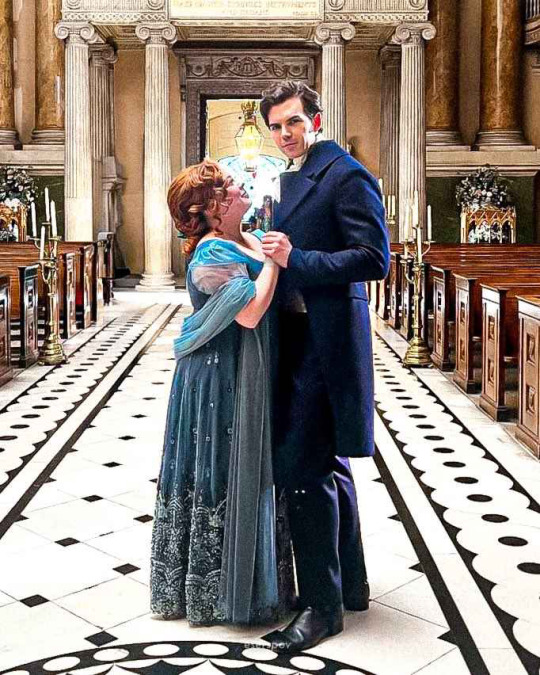
341 notes
·
View notes
Text
best buddie episodes and why:
2x01 under pressure- duh. buck’s bi panic was so funny to watch and him folding immediately after eddie looks at him with his big brown eyes is peak
3x03 the searchers- the tsunami arc has always been that girl. the christopher eddie reunification scene paired with “there’s nobody in this world i trust with my son more than you” like pls just kiss already IM TIRED
3x15 eddie begins- i’ve been watching since the show has been on air, and there has been maybe two episodes that top this one. this was the episode when i started seriously shipping buddie. buck going absolutely apeshit when eddie got buried and most of eddies flashbacks including buck was what really sealed the deal for me.
4x03 future tense- this one is just so domestic. the scene where buck and chris are playing video games on the couch and buck buying an expensive coffee maker solely to prank eddie… they’re so married it makes me sick
4x14 survivors- this is top 3 buddie episodes of all time. sniper arc you will always be famous!!! eddie asking buck if he’s hurt, the physical touch, BUCK CALLING EDDIE “EDS” oh that boy is down so bad. the will scene takes the cake though. I think this episode is the best one in terms of buddie’s relationship progression.
5x06 brawl in cell block 911- the main parts of this episode that i really love are when buck gets very protective over christopher OR when he thinks eddie gets shot (again.) season 5 was probably the slowest buddie season, but there are still soooo many good moments sprinkled in
6x10 in a flash- again, very obvious. “alright cowboy go get em!” kills me every time. this episode is why i can’t decide whether i want a buck nde or an eddie nde in 8b. i want to see eddie DISTRAUGHT again… him trying to pull buck up towards him screaming is just too good
7x04 buck, bothered and bewildered- another peak buddie episode. even tommy knew that buck was trying to get eddies attention the whole time. i’m honestly surprised that this wasn’t bucks realization arc. The entire episode was focused on eddie. even when tommy came over to flirt with buck he STILL found a way to talk about eddie, multiple times. bi buck canon was also life changing and this episode is top 3 for that reason.
7x05 you don’t know me- season 7 has banger after banger episodes. watching the trailer for this episode and seeing eddie crash bucktommy’s date was the icing on the cake tbh. this ep is how i knew marisol and eddie were not going to last. eddie stop terrorizing the women of LA challenge (level: impossible.) the coming out scene is also just one of the best buddie scenes they’ve ever done, it’s so raw and emotional and captures their characters so well.
7x06 there goes the groom- another season seven episode but it has to be included because of the bachelor party. bachelor party buddie is going to be nearly impossible to top. it’s also cute how they don’t leave each others side for most of this episode.
8x06 confessions- i think this episode is top 3 for buddie relationship development. it’s very bucktommy centric but we get hot priest talking to eddie and bucktommy bones. AND how could we forget the risky business scene. i think this episode is when they put buddie canon in motion. eddie dealing w his catholic/regular guilt and saying he’s straight smells like a gay arc to me. buck immediately going to eddie after breaking up with his boyfriend, AND interrupting eddie’s activity that is supposed to bring him pure joy just seems too obvious. at this point we are past subtext and now getting into true buddie canon territory.
anyway! hope this was enjoyed. if anyone has other episodes they think should be added please share!!! there are so many good episodes i probably missed <3
316 notes
·
View notes
Note
OTNF, do you have an example of a show or other work that actually legitimately queerbaits the audience?
Because I know what queerbaiting is, and I know that all the examples I seen thrown around are acutally examples of queer coding, queer subtext, or of a popular fandom ship simply being a ship instead of being canon, but I can't actually think of anything that actually is queerbaiting.
And I know a commenter is about to chime in with the BBC Sherlock show. So I'll preempt it by saying that that one is a fandom ship and the show itself has less queer subtext or coding than most adaptations, even if it has more dumb gay jokes.
--
In my opinion, the number of shows that did this in canon is functionally zero.
The closest real example is that Teen Wolf promotion where they joked about Sterek as though they'd make it canon if people voted for the show (in the Teen Choice Awards? something of the sort).
The entire concept is deeply flawed because it is heavily predicated on the idea that this part of the audience is huge and actively courted by mainstream media makers in the US and places like that. In reality, normie Hollywood types are usually dense as hell about the level of hoyay in their media. When it's brought to their attention, they're bemused or amused or dismissive or think it's nice if fans can see what they want in a canon. (Sometimes, this is because they're terminally straight. Sometimes, it's because they genuinely and eternally see buddy cops as Just Bros and a boring story about pursuing someone whom you will never regard as an equal or bestie as Romance, and this is often true of queer people making mainstream media.) In a few cases, they tried to make something gay, but the producer/studio/network head/Chinese government/etc. stopped them, which is still not queerbaiting. What they aren't is excited about the economic opportunities provided by pulling a bait and switch on that part of the audience.
The vast, vast, vast, vast majority of media either does not give two shits about our kind of audience or is aimed specifically at us and not others. The idea of gaining meaningful ratings or money with this kind of move is just... not how most industries work.
Related concepts are real (as you say), and people keep trying to redefine queerbaiting to cover some of them so they can pretend the term has any actual utility instead of just using the older terms for these specific other concepts. The narrow form of queerbaiting is a self-important delusion that fandom made up to torture ourselves with.
I wish all those dumbass undergrad papers I see blathering on about the subject would start their exploration by at least trying to figure out whether the practice is real in the first place and why and how the idea of it spread instead of taking it as a given.
252 notes
·
View notes
Text
"Queer-coding" is only useful for a narrow range of media and it'd be great if we could stop using it for literally everything
Here's my problem with it:
The term originated to discuss negative media depictions of cultural stereotypes for LGBTQ people in the United States. It is inherently tied to the conditions of media censorship at play in the USA during the 1900s, with the Hays Code restricting depictions of anything it deemed "immoral."
Now, for whatever reason, people are using it to refer to literally anything they see as "kind of gay."
The term begins with the premise that making the audience see the character as queer is the creator's explicit intention. The creator knows the stereotype, you know the stereotype, so they are using the stereotype to convey to you something they can't say outright.
However, you can see how this goes awry, right?
The second we cross language, cultural, or even generational lines, this gets messy.
What traits are deemed queer? What behaviors or characteristics are seen as gay? The reality is this is a huge spectrum, and every culture has a different relationship with queerness in its history. For that matter, every nation has its own unique issues with censorship. A viewer from the USA may interpret a Japanese character as exhibiting stereotypically gay characteristics, but does that mean the Japanese creator intended it to be taken that way?
But then, if we try to account for what stereotypes Japanese media might use for queer characters to ascertain what the Japanese creator might have intended, we arrive at the same dead-end: the implication that queerness is only really portrayed via (usually negative) stereotypes.
This suggests that if media does not contain enough "clues" to imply a character is queer to the broadest possible audience, a queer reading of their story is out of the question. "Queer-coding" is treated as a metric of validity, a way to "prove" queer interpretations are allowable, yet it is based in stereotypes, censorship, and presumption of authorial intent.
The way queer-coding is continually brought into discussions about art essentially creates an ultimatum: media needs to be "explicit" by using direct (usually English language) terminology, or characters need to engage in things like kissing, declaring one's love, sexual activity, etc., yet even those are dismissed at times.
This creates a dynamic where art which is intentionally subtle or multifaceted may be seen as exhibiting cowardice rather than artistic complexity. It implies that if something is not "confirmed queer," queer themes cannot be read into it, queer subtext cannot be interpreted from it, and queer people are not allowed to identify with it.
This limits art. This builds walls that diminish human connection; it creates a situation where queer people are discouraged from seeing themselves in media not explicitly designated for them. Because, obviously, queer people are a completely different species from "normal people," right? Their feelings and experiences are so alien and distinct, there's no overlap anyone else could sympathize with.
You don't need permission to see queerness in art. You don't have anything to prove. Queer interpretations are just as valid as any other, and anyone who tells you different is selling something.
As I spoke about in this post, authorial intent is not more important than audience perception, and trying to infer the creator's intentions is a fool's errand. Especially in a situation where censorship is supposedly at play, any public statement from a creator could be reasonably disregarded as dishonest, which leaves us alone with ourselves and the work.
Which, by the way, is the only real way anyone experiences art. It's not you and the creator, it's you and the work. When people try to infer authorial intent, they are not discerning real, objective truth. They are sorting available information through a filter of what they consider believable before arriving at a subjective conclusion, which they then project onto a mental image of the creator.
In literary analysis, we select a "lens" through which to view art. This means that we decide to accept certain ideas as given fact and explore what the works says once we look at it that way. For example, we could accept as fact the idea that a number of the core cast are queer in some way. It posits the question: once we dismiss heterosexuality and cisgender identity as the only options, what do we see?
This is an intellectual concept, but the reality is that everybody naturally applies their own lens to art when they view it. This lens is not nearly so rigid or clearly defined, but it is a lens nonetheless, defined by their experiences, values, and individual personality.
I would love for people to stop using the phrase "queer-coding" quite so freely. It centers a need for validation and hinges that on "what the creator intended."
If you want some ideas for different language about this, consider these:
A theme might be queer by exploring broad topics queer people often struggle with, such as secrecy, shame, or self-acceptance.
The subtext of something might be queer in that one could read a double-meaning or deeper implication to the narrative device or scenario.
A work might contain allegory, symbolism, imagery or parallels that could be interpreted with queerness.
I don't think it's interesting to try to "win" by convincing you I personally know what the creator intended. That leaves the art static, unchanging, and lifeless. I would much rather tell you how I personally see the art and why, because that dynamic allows all of us examine the work more deeply.
In the end, it is not an author's edict in some external statement that gives art meaning. It is the audience. Our feelings are what give art meaning, and connecting with other people about what it all means to us is what keeps art alive.
#I said I'd talk about the queer-coding thing at some point so#here ya go#anyway let's get back to those cute boys and how in love they are
185 notes
·
View notes
Text
Psst hey *pulls you closer* Canon middle-aged queer relationships and multiple canon queer/queer-coded characters. *lets you go* Go watch Venture Bros.
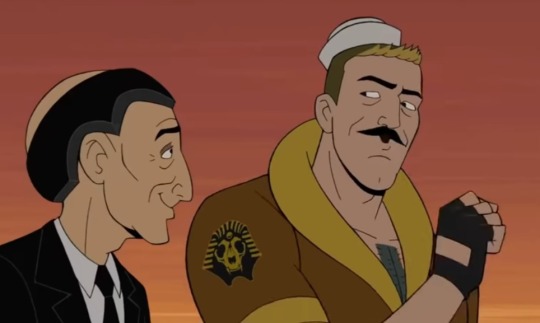
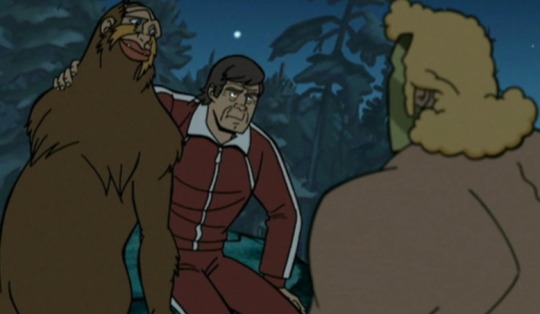
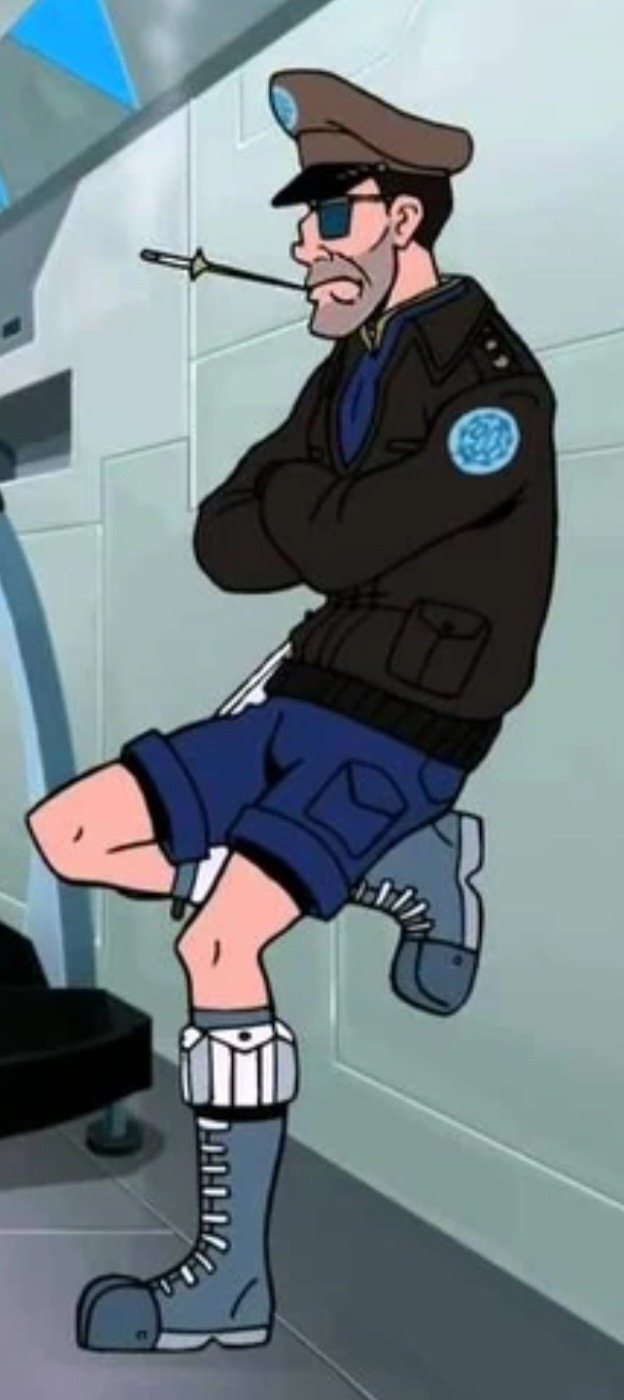
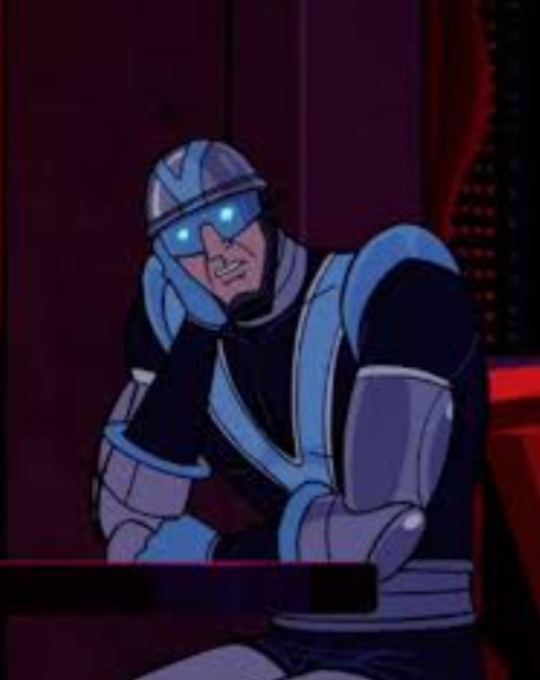
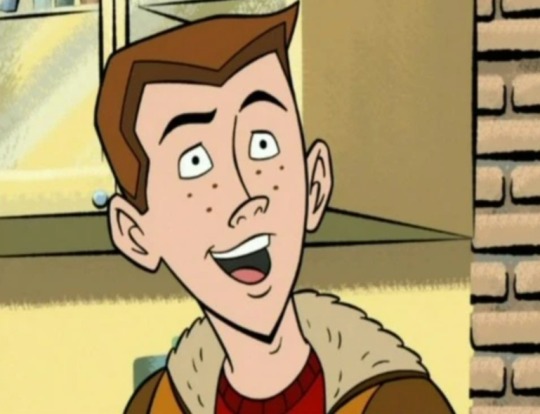
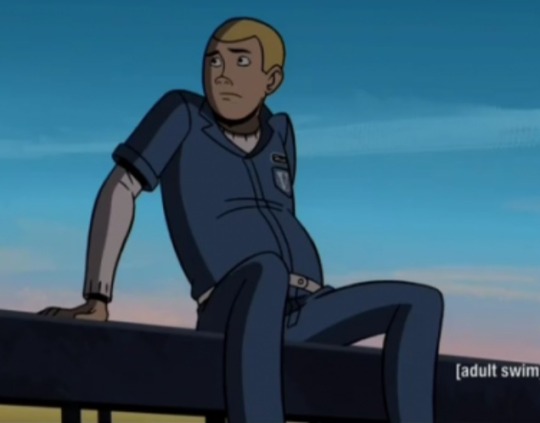
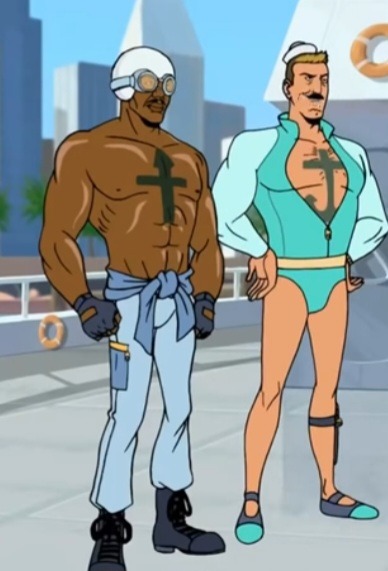
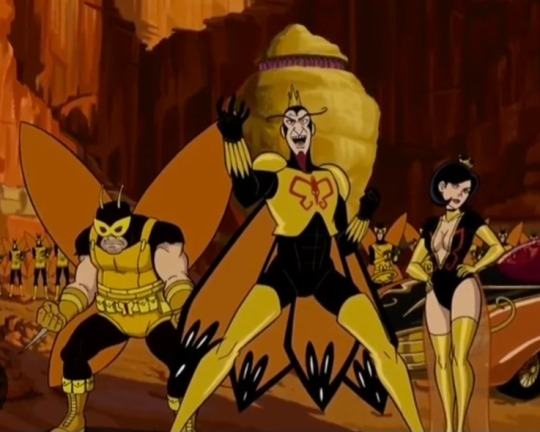
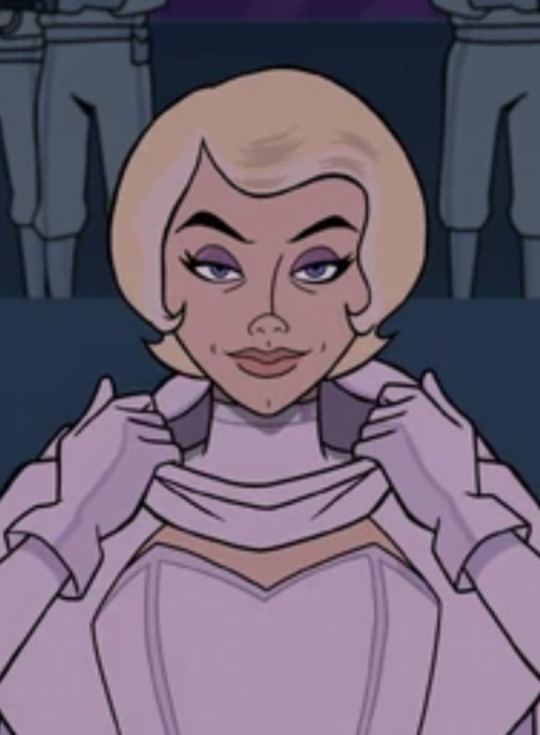
There are WAY more than these but I can't put em all up here because queer coding is up to interpretation. I say that everyone in Venture Bros is queer until proven straight but that's just me.
I wrote a whole-ass essay and then accidentally deleted it so the wording on this will probably be off, but it feels important so I'm gonna try be succinct.
Minor spoilers ahead! Skip paragraph three if you don't want those, then resume on paragraph four.
Full disclosure, this is a show that started in the early 2000s and has a LOT of issues in the first few seasons as well as a couple in the later seasons. There are transphobic and homophobic jokes, ableism, racism, and sexism. Sergeant Hatred is a walking trigger warning for about three seasons straight. It goes without saying but I'll say it anyway: DON'T watch this show if you have multiple triggers or are easily offended.
Having said that, these writers realized the problems with what they were writing and have worked to remedy those issues through commentary, retconning, and public acknowledgement of the early seasons' failings. Their opinions evolve and so does the show.
Shore Leave is a flamboyantly gay man who was initially intended to be a one-off joke about the G.I. Joe series and the Village People. Instead he has morphed into a three-dimensional character who presents comfortably as both masculine and feminine. He's in a loving relationship with another gay man, Al, who is flamboyant but tends to be a little less flashy. Steve Summers and Sasquatch have been a happy couple for years now--and all because the epitome of toxic masculinity, Brock Samson, helps them find a quiet cabin away from the government hunting them. Brock's mentor, Hunter Gathers, is a canonically detransitioned trans woman who struggles with her identity throughout the show (I'm still waiting for her to retransition despite the show's cancellation). Hank is perfectly at ease in a hyperfeminine strength suit, and Dean also goes through identity struggles that are never played for laughs and are heavily if not explicitly queer-coded. Vendata's queerness is understated and exists simply as a fact rather than being joked about. Sky Pilot is similar, though slightly more in Shore Leave's camp in terms of presentation. Sheila and the Monarch are self-proclaimed swingers and could be read to be in a poly relationship with Gary, their henchman. Debbie St. Simone has a rather homoerotic obsession with Sheila and is almost definitely bisexual.
The Venture Bros universe is full of queer rep, and the creators of the show write it in with intention. Doc Hammer and Jackson Publick talk about wanting it to be treated as fact rather than completely defining each of their characters--they talk about how few women are in the show and why (Johnny Quest and G.I. Joe, the inspirations for Venture Bros, are heavily malecentric and there's constant homoeroticism in them for that reason). They acknowledge the flaws and work to improve themselves and their writing. This has culminated in a surprisingly moving series about love, death, grief, trauma, and change that radiates queer subtext from any angle--especially Dean's journey.
Try the show at least up to season 4. The first three seasons are on Netflix and the rest are on Adult Swim. If you still don't like it, that's fine. Thank you for trying! Just know that it's out there and that it's an example of how human beings can change and become better people. Doc Hammer and Jackson Publick aren't perfect and neither is the Venture Bros, but for what it is it's a damn fun (shockingly so) show.
#venture bros#venture bros spoilers#al the alchemist#shore leave#hank venture#dean venture#steve summers#sasquatch#hunter gathers#vendata#the monarch#sheila fitzcarraldo#dr mrs the monarch#henchman 21#gary fisher#sky pilot#debbie st simone#brock samson#queer rep#queer#gay#transgender#transfem#bisexual#pansexual#polyamory?#gender fuckery#adult animation#pete white and billy whalen honorable mention#venture bros propaganda
270 notes
·
View notes
Note
I heard a raw line from Guilllermo Del Toro the other day about monsters being the perfect way to express human failure:
“…monsters, I believe, are patron saints of our blissful imperfection, and they allow and embody the possibility of failing.”
And i was wondering your take on this quote in relation to things like vampire and werewolf and other semi-monster subtexts. “Monstrous” humans that are ironically allowed to act more human more often than… humans. I just find the attempt to make an outlet for imperfection while still at large criticizing it fascinating.
I mean, yeah, there's a long history of interpreting monsters through queer, anti-colonial, feminist and other Outsider lenses for exactly those reasons. The monster is the Other who is vilified by the in-group, which represents all that the in-group hates. The monster must, by its nature, fail to live up to the standards and expectations of the in-group, which is why it must be destroyed. But that also means the monster is free from the standards and expectations of the in-group, including oppressive and bigoted ones.
So, as an example, if you're queer, and rhetorically treated as inhuman and monstrous and diseased anyway, or eugenically classified as a deviant mutation or sub-derivation of "real" people, there is real appeal and a real sense of resistance in claiming monsterhood, in embracing it and glorying in it.
In part, that's what the rallying cry "we're here, we're queer, get used to it!" meant and still means. It is a reclaiming of monsterhood as a source of strength and community and pride, rather than shame. Slurs are used to Other queer people, to set them apart from "real" people and mark them out as a monstrous deviation from the virtuous norm - slurs are used to call us monsters. And thus a lot of queer people find a lot of power and freedom in reclaiming them, in turning their Othering into a flag to rally around.
And I think that's still a big part of the appeal of the monster, honestly, that freedom from being what someone else thinks you ought to be.
If you're a monster, you don't have to have the perfect body, you don't have to suppress your lust or your love. You don't have to shave your body hair or dress correctly for your assigned gender, or have a white picket fence house with a spouse and 2.3 children. You don't have to sit primly at the dinner table, you don't have to repress your emotions, you don't have to hate the foreigner or despise the gays or fear the trans agenda. You don't have to have a small, straight nose or perfect cheekbones, you don't have to wait to fuck until you're married, or pretend you want to fuck at all. You don't have to want to get rich or be a CEO, you don't have to pull yourself up by your bootstraps or be on your grindset, or cheer when the cops clear out a homeless camp.
To be a monster is to be free from the inhumanity that is forced on us by white supremacy, by fatphobia, by heteronormativity, by imperialism, and by the interests of capital. To be a monster is to be human in all the ways that are inconvenient to oppression.
... but I went off on a tangent there a little bit - vampires and werewolves, right. I have no theoretical or academic basis for any of this, so this is entirely a personal hot take, but I think vampires are perhaps a bit more about "passing" as a fantasy. Not necessarily in a gender sense, but the ability to keep your true nature undetected by the "normal" folk, while the secret things that make you different also make you dangerous and powerful. Surviving by stealing sustenance from a world that hates you, on terms that are entirely yours to dictate. "I will survive even if it kills you," that kind of vibe.
Werewolves, on the other hand, feel more like a defiant, angry embrace of the monstrous. Transforming into something vast and powerful and furious, growing out of your skin, out of your form, out of your boundaries; howling your nature to the moon and mauling any motherfucker who has a problem with it. Giving in to all the beastly unnatural urges, and diving into the horrible monstrous wants and desires that boil inside you (which, remember, include things like Not Wanting To Fuck or Wanting To Hold A Girl's Hand In A Lesbian Sort Of Way). Less the "I outfoxed your social game and drank you dry" slick vampire power fantasy and more the "call me a slur one more time and I'm going to wear your entrails like a fucking scarf" power fantasy.
Again, that's just personal hot takes, everyone's understanding of the monstrous in relation to themselves is different. I've seen a number of genderfluid and nb people use monstrousness as a way to defy occupying a shape that can be gendered for example.
828 notes
·
View notes
Note
I know it's been nearly two years since you said this so you don't have to answer this in any way shape or form if you simply don't remember, but in the post where you and fnord888 talked about Link from the Legend of Zelda series, what exactly did you mean by "lets them keep doing the princess-rescuing quests without awkward questions like you get with Bowser and Peach"?
(about this)
I mean sex.
Bowser isn't the most textually sexualized Nintendo character out there, but he's pretty far along the spectrum- there's the outfit, the muscular physicality, the fact of his having kids, and of course the enduring focus on Princess Peach. Just as sexualization of a female character would usually take a passive or aesthetic form (e.g. a large bust or revealing outfit), the sexualization of Bowser focuses on his active and agentic traits; beyond just the imposing body, the social power of monarchy, and the tendency towards violence, Bowser is a character who pursues and desires women. In a word, he's horny.
(I'm just pointing at this very very briefly rather than going in to details, and none of this is original to me; if you poke around online, you won't have trouble finding some pretty interesting analysis of Bowser's relationship with gender and sexuality. Among other things, he's something of a gay icon.)
It's easy, almost to the point of being reflexive, to read the Peach-Mario-Bowser dynamic as being a love triangle of one sort or another, no matter what the official lore of the games has to say; the form of what we see on-screen matches some very well-worn and explicitly romantic narrative archetypes. Even the official movie made Bowser's attraction to Peach text, rather than subtext.
Tying this back to the original post about Link-
Back then, I was arguing that Link's "silly little guy" factor means that stories about him tend not to be read as sexually motivated. Even as he spends game after game actively in pursuit (in some sense of the term) of a woman, there's no real sense of Link as pursuing Zelda sexually.
Link and Mario are both, sort of, doing the same thing in the same way- exploring dangerous unknown terrain filled with many enemies, in pursuit of a high-status woman. But Mario is a grown (albeit goofy) man with a mustache and a blue-collar background, and his princess is held captive by an amorous and heavily-muscled opponent who wears a spiked leather harness to work; the audience reads these cues and infers a particular set of motives and a particular kind of subtext. Link is a very different silly little guy; his motives are explicitly holy and implicitly chaste. The kind of silly that Link is- and the kind of villain he fights- provides a subtle and I think very interesting contrast with Mario, one that allows for the games to translate Arthurian romances, and the sometimes very strange narrative forms of the knight-errant, to modern and even postmodern audience tastes.
67 notes
·
View notes
Text
it's pretty implied that ellie never came out to joel in the proper sense. she lets him assume that she's into men, gives him the false satisfaction of "seeing" her "crush" on jesse, does not correct him. she's fairly confident in being gay in public for others to see and having others close to her know; so why not correct him? why dodge the topic?
was it out of fear? could it be that she never broached the topic despite being close to him in the early years because of the possibility of his reaction being negative? that she was afraid that out of all things that could force them apart (further apart after they split), him reacting badly to her being gay would be the worst?
what about at the dance? would she have been as wound up as she was if the moment hadn't been an encounter with a vicious homophobe? maybe she would've still snapped without this context, but why is she immediately on the defensive against joel after he sticks up for her?
what about the porch scene? why did she refute his question of dina being her girlfriend so insecurely, looking away, nervously and quietly stumbling over words? why isn't she mean about it? why doesn't she get defensive at the question? why did she lash out again when he expressed acceptance?
i think these scenes revolving around her queerness indicate it as such; that ellie never told joel for fear of a response, that she lets him think what he wants because that's the easiest way for it to be. then, when she's ready to face off against a homophobe, because that's the way things are, that's what she can expect, and joel defends her, she lashes out.
it's such a clear juxtaposition of support and hatred between joel and seth, and being faced with joel's acceptance is too much, makes her turn to the anger she'd been holding onto and reinforce what she thinks is true -- that she doesn't need him. and in the fallout, as her regret dawns on her, so too does the realization; he was protecting her, like always, without hesitation, over this thing she was always afraid he wouldn't accept her for.
in the porch scene, joel chooses his words wisely, and asks if dina is her girlfriend -- not "so you're gay?" or "why did you never tell me?" or "how long has this been a thing?" -- with such a casuality that it seems to throw her off. it's like ellie can hardly get the words out. she refutes the idea, fumbles for each following part of her response, is tense. she wasn't prepared for the question.
and when he finally asserts his support for her, in as explicit terms as he can, you can see ellie become emotional, touched for a moment but overcome, before she launches into the defensive again, exactly like at the dance scene -- meeting his kindness with hostility as a way to cope with her emotions.
and then, in response to her basically saying her life doesn't matter, he affirms that it does.
so he's now affirmed two things that ellie has doubted: that he accepts her being a lesbian, and that her life matters. a conflation of the two, in ellie's mind, may have come after; and after that, her olive branch.
and yeah, him affirming these things for her is fully in the context of his overwhelming parental love for her and her complex feelings about being the cure, but within a queer subtext, it means more. it's such a familiar thing to slink around loved ones and hide being gay/queer for fear of any type of response, and lying by omission in conversation just to keep that state of peace, of normalcy. ellie, with all her brutishness and bravery, falls into it like anyone else, because even while mad at him, she valued that response from him.
a lot of people seem to think that the approach to ellie's queerness is nonchalant, that it's just some unrelated thing about her, but i think that it holds more weight in the narrative that what is explicitly spelled out. it's subtle but it was a deliberate choice to place her queerness at the center of the confrontation. i think that's why ellie's relationship with dina took center stage in the story, and why so much time is devoted to just them -- because her being queer matters to her character, but in a way that perhaps only a queer person can see, analyze, and appreciate (without being blatant enough to anger certain other fans).
#i've been re-evaluating my long-conflicting feelings on the concept of coming out#tlou#the last of us#tlou2#the last of us part 2#this isn't an internet breaking take#i'm sure someone has said this before#but i'm just...thinking.#the meta of us#talkies#ellie williams#joel miller
665 notes
·
View notes
Note
🔥 Buffy!
ok so i think i've talked about some of my unpopular opinions about ms. buffy summers before, maybe most notably that s5-6 buffy and her struggle with depression/raising dawn/accepting loss and learning to meet life with joy is vastly more emotionally and intellectually compelling to me than s1-4 buffy and her struggle with being the slayer vs. wanting to be a normal girl. however i think my MOST unpopular opinion about buffy, and the #1 reason i don't really ship fuffy even though i appreciate the subtext and definitely think faith was in love with buffy, is that i think that girl is not figuring out she is bisexual until she's in her 80s at least. like i'm sorry but she is soooo repressed. just as a person in general but also especially about her sexuality. the rest of the people in her life are all going to come out as queer (xander as bi, faith as a lesbian, andrew as gay, dawn as lesbian or bi, giles obviously already knows he's bi but he'll get a boyfriend or something) and it is just never going to occur to her that she could be anything other than straight. and then one day when she's 85 one of the other women in her book club, who is a few years older than her, is going to announce that she figured out she's a lesbian, and buffy is going to be like. wait you can do that in your 80s??? how did you know you were gay??? and this woman is going to describe her attraction to women and buffy is going to think back to her relationship with faith and also maybe to a few other women throughout her life and she's going to be like oh. hm. and she's going to call up dawn and be like. dawnie do you think maybe i could be bisexual. and dawn will be like yeah sure if that's how you feel. and then she's going to call up faith and be like. hi faith i know we have not spoken in 3 years but remember when we were teenagers. do you think maybe our relationship was um. a little bit gay? and faith, who accepted that she was head over heels in love with buffy 60 years ago and spent years coming to terms with it and finally moving on and coming to love herself as a separate entity from buffy and opening herself up to love other women who are not buffy, will be like. don't call me again. and then she'll hang up. and buffy will stare at the phone all offended like ?????? what's her deal??? is she homophobic??? what a weirdo
#sorry noble fuffy warriors but i simply cannot imagine it playing out any other way. hashtag speaking my truth 😔#it's what you do afterwards that counts#i'm gonna be a fireman when the floods roll back#occidentaltourist#btvs
91 notes
·
View notes
Text
2025 Book Review #15 – Notes of a Crocodile by Qiu Miaojin (trans. Bonnie Hu)
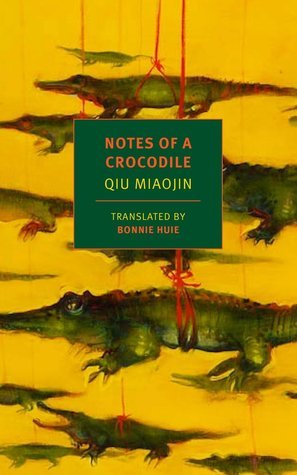
Many moons ago, I asked for and got a bunch of recommendations for non-English literature with good translations. The only thing I knew about Notes of a Crocodile when I picked it up was that a stranger on the internet thought it fell into that category – and they were entirely correct! This was not exactly an easy read – and I desperately wish I had the proper cultural context (of late ‘80s/early ‘90s Taiwan in general and queer and youth culture therein specifically) to get all the things that flew right over my head – but this was an interesting and often beautiful book all the way through.
The story is presented as a series of journals written by a woman who we only ever get the nickname Lazi for across her college education in Taipei during the late ‘80s and early ‘90s. It is, specifically, a chronicle of heartbreak, angst, and the many different ways a life-ruining mental health crisis can express itself over time. The spine of the book is her romance with Shui Ling, a woman a year above her in school who she followed to university. They are both deeply in love with each other, terrified of this, and totally incapable of expressing themselves to each other or making any sort of life together in a way that doesn’t leave one or both of them contemplating suicide. Every time they break up Lazi collapses into an entirely different kind of depressive spiral – and in the mean time, finds friends, connections, and other nearly-as-ill-advised romances.
Intercut between all this are allegorical passages about a frenzy of public fascination around the crocodiles living hidden throughout society as they go about their days in nearly-perfect humans suits, and the different opinions on just what should be done with them. Beyond getting that this is at least broadly a metaphor for the contemporary reaction to queer people I have to admit that what must have been the overwhelming majority of subtext and meaning of these passages flew right over my head.
Which stands out, because those passages are the only part of the book that really rubbed my face in how little grounding I had in its context. It is wrong to say Lazi’s character and struggles are universal – her whole character is deeply informed in trying to come to terms with what being a lesbian means in a culture and at a time where that’s a deeply precarious thing to be, and not one with any legible futures to imagine for yourself – but at the same time ‘depressed queer college student gets into hot mess of a first relationship, does not cope well’ is not exactly a novel or exotic narrative. Even beyond the specifics, Lazi’s melodramatic angst, self-centred self-loathing, tendency to wallow in her own misery, and terrifying lack of a vision about what kind of life she wants to lead are all things that are going to be at least a bit relatable to anyone who has ever been 18. Not to say the reading experience wouldn’t have been enriched by knowing more about the culture and immediate of post-marital law Taiwan – a context that’s obliquely mentioned often enough to loom over things a bit – but I never found lacking it prevented me from enjoying the book. And there’s not really any better way to get that knowledge than throwing myself into things like this and picking it up as I go.
The prose is a bit difficult to talk about, because I’m totally unsure the degree to which, say, the dialogue seemed to jump wildly between registers of formality with little warning is a) an artifact of the translation, b) a deliberate part of the book’s formal experimentation c) exaggeration for the sake of communicating the character’s emotions or d) just how gay 18-year-olds in 1990 Taipei talked. Presumably some combination of all of them? But there was a decent number of little things like that, which combined to make it a bit of a mentally taxing book to parse and guess quite how things are supposed to be read.
Not that either the prose or the translation is bad, to be clear. Translating literary fiction honestly seems almost as horrible as translating poetry – so much of the value is in the specific aesthetic affect and playing with subtleties of meaning, effectively translating it into another language almost seems worse than writing it from scratch. So both author and translator deserve a lot of credit here – there were numerous passages that were beautifully written enough to make me stop and re-read them, or got across Lazi’s emotions vividly enough to be legitimately affecting. There were just also plenty that felt a bit clunky and very clearly written in a language that arranges and phrases things differently than English.
All in all, this is by far the most pretentiously lit-ficcy book I’ve read so far this year, and I couldn’t be happier about it. If it seems at all like your sort of thing, would absolutely recommend giving it a try.
#book review#notes of a crocodile#qiu miaojin#bonnie hu#literature#2025#20th century#in translation#Taiwanese lit
52 notes
·
View notes